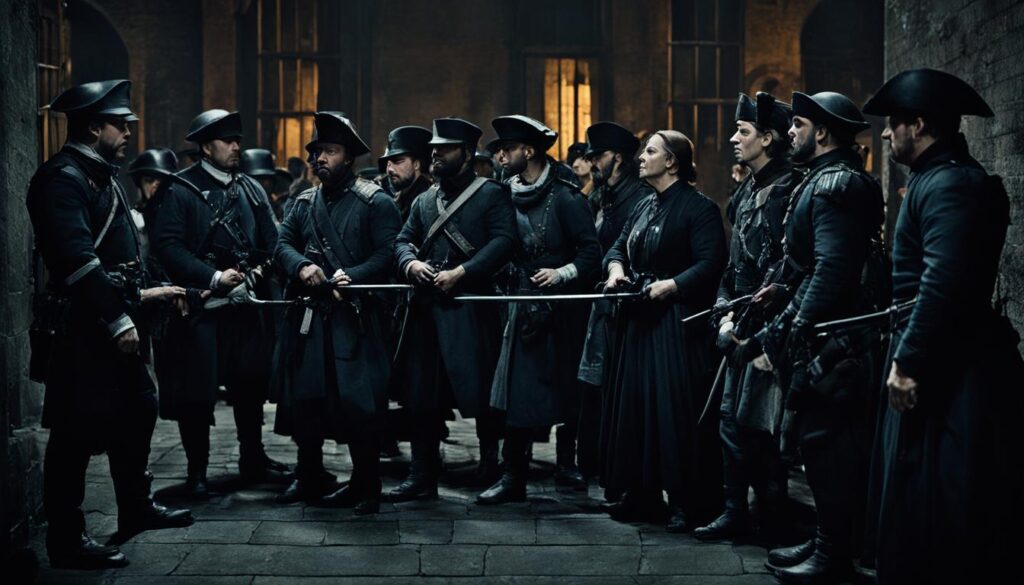In this audiobook review, we will explore the captivating narrative of “The Night Watch” by Sarah Waters, set during the tumultuous period of World War II. As listeners follow the lives of the characters through the dark corners of London, the story unfolds with great sensitivity and nuance, leading to a devastating climax that will leave a lasting impact.
Whether you are a fan of historical fiction, LGBTQ+ literature, or simply enjoy a well-written story, “The Night Watch” is sure to captivate and enthrall you. In this review, we will evaluate the audiobook’s narration, plot, characters, historical context, writing style, and audience reception, providing a comprehensive assessment of its strengths and weaknesses.
Key Takeaways:
- “The Night Watch” by Sarah Waters is a gripping and poignant audiobook set during World War II.
- The story follows the lives of several characters in London, portraying their struggles and relationships with great sensitivity and nuance.
- The audiobook’s narration style and performance are excellent, and the writing style is effective in conveying the story’s atmosphere and emotions.
- The book explores various themes and motifs, including love, loss, and the impact of war on personal lives.
- “The Night Watch” has received critical acclaim and is highly recommended for fans of historical fiction and LGBTQ+ literature.
Overview of “The Night Watch”
Sarah Waters’ novel “The Night Watch” is a poignant story set during the turbulent times of World War II. The book is divided into three parts, each exploring the lives of a group of characters who are intricately connected. These characters face harrowing challenges and difficult decisions as they navigate through a London besieged by war.
The main themes of “The Night Watch” revolve around love, loss, and the struggle for survival. The characters are complex and well-developed, with each one carrying their own secrets and motivations. The setting is also an essential part of the novel, with London depicted in vivid detail – the bombings, the blackout, and the daily struggles of the people.
The Night Watch provides a unique perspective on the events of World War II and is a captivating read that leaves a lasting impression. The next section will delve deeper into the narration style and performance of the audiobook version of this book.
Narration Style and Performance
One of the most essential elements of an audiobook is its narration style since it affects how listeners engage with the story. The narration style employed in “The Night Watch” is captivating and engaging, immersing the listener in the narrative effectively. The narrator’s pacing and tone bring the characters and story to life, creating a compelling and immersive experience for the listener.
Furthermore, the performance of the narrator is outstanding, providing an experience that is both emotional and engaging. Her captivating and clear delivery of dialogue is effective in conveying the tone and mood of the story, whilst accurately portraying the characters’ emotions. Overall, the narrator’s exceptional performance adds a new dimension to the audiobook of “The Night Watch,” making it a pleasurable listening experience.
Plot Summary
In “The Night Watch” by Sarah Waters, the story is told in reverse order, beginning in 1947 and ending with the start of the World War II in 1941. The plot follows the lives of four Londoners and their interconnected relationships before and during the war.
Kay Langrish, a caring ambulance driver, falls in love with Helen Giniver, a married actress, who is also in a relationship with Julia Standing, a lonely writer. Meanwhile, Duncan Pearce, Kay’s former lover, is struggling with his past and searching for redemption.
As the war nears, the characters’ lives are profoundly affected, and they must navigate the challenges and tragedies that come with the conflict. From the evacuation of Dunkirk to the Blitz in London, the story explores the struggle to hold onto love and hope amidst the chaos of war.
The novel’s ending brings resolution, but not necessarily happy endings for each character. Through the intense emotions and experiences of the characters, “The Night Watch” portrays the immense impact that war can have on relationships, friendships, and love.

Character Development
Character development is a key aspect of “The Night Watch,” with Sarah Waters masterfully crafting complex and multifaceted characters that drive the narrative forward. Kay Langrish, for example, is a character that undergoes a significant transformation throughout the story, gradually revealing her vulnerabilities and desires. Duncan Pearce, on the other hand, is initially presented as a naive young man but evolves into a more mature and confident individual over time.
Waters’ attention to detail allows for a deep exploration of each character’s motivations, strengths, and weaknesses. There are nuanced relationships between the characters, with complex dynamics that add depth and complexity to the story. Moreover, the characters are all flawed and imperfect, making them feel more realistic and relatable to the reader.
The table below provides a comprehensive overview of the main characters in “The Night Watch,” detailing their personalities, relationships, and storylines:
| Character | Personality | Relationships | Storyline |
|---|---|---|---|
| Kay Langrish | Determined, secretive, vulnerable | Former lover of Helen, caretaker of elderly gentleman | Struggles to come to terms with her sexuality while navigating the dangers of the war-torn city. |
| Duncan Pearce | Naive, romantic, determined | Friend of Kay, lover of Robert | Joins the war effort as an ambulance driver and discovers his own inner strength and courage. |
| Helen | Confident, manipulative, selfish | Former lover of Kay, close friend of Viv | Maintains a tumultuous relationship with Kay while grappling with her own demons. |
| Viv | Confident, independent, empathetic | Friend of Helen, former lover of Reggie | Works as an ambulance driver and forms a deep connection with her patients, particularly the traumatized Neville. |
Overall, the complex and dynamic characters in “The Night Watch” make for a compelling and immersive listening experience, with their individual journeys interweaving to create a rich and engaging narrative.
Historical Context
The Night Watch is a historical fiction novel that takes place during World War II. The story explores how the war affected the lives of ordinary people, particularly women, who were left to cope with the devastation, loss, and uncertainty of the war. Sarah Waters brilliantly captures the historical context of the period, portraying the details of everyday life and the social and cultural changes that occurred during the war.
One significant aspect of the historical context of The Night Watch is the portrayal of the Blitz and its impact on London. The Blitz was a series of bombing attacks by the Nazi regime that targeted British cities, and London was hit particularly hard. This symbolized a significant turning point in the war and had a profound effect on the people living in London during that time.
Waters skillfully uses historical details and events to enhance the story’s realism and create a sense of authenticity. Despite being a work of fiction, The Night Watch is an accurate portrayal of the events and sentiments of the wartime period.
Writing Style and Language
Sarah Waters has crafted a mesmerizing tale in “The Night Watch” by skillfully using language and writing style to immerse readers in the world of World War II-era London. Her writing is clear and evocative, with vivid descriptions that paint a picture of the city and its inhabitants. The use of slang and colloquialisms adds authenticity to the dialogue, making the characters feel like real people rather than caricatures or archetypes.
Furthermore, Waters employs a nonlinear narrative structure, which can be challenging to execute effectively, yet she manages to pull it off with finesse. The use of flashback and foreshadowing builds tension and keeps readers engaged, while also deepening our understanding of the characters and their motivations.
Overall, Sarah Waters’ writing style and language in “The Night Watch” are impressive, creating a captivating experience for readers that pulls them into the world of the novel.
Themes and Motifs
In “The Night Watch,” Sarah Waters masterfully weaves various themes and motifs into the narrative, creating a multi-layered story that resonates with the readers. One of the prominent themes explored in the book is the notion of loss and its various forms, whether it is the loss of loved ones, identity, or hope for the future.
Another theme that stands out is the exploration of social norms and expectations, reflecting the social changes that occurred during World War II. The book also delves into complex relationships, including queer relationships, which were taboo during that time, embodying the struggles and triumphs of individuals who defied society’s expectations.
In terms of motifs, the imagery of the city and its ruins recurs throughout the book, representing the physical and emotional destruction that war brings. The image of clocks and timepieces also makes several appearances, symbolizing the fleeting nature of time and the inevitability of change.
The motif of clocks in “The Night Watch”
The motif of clocks and timepieces in “The Night Watch” is a recurring element that adds depth and symbolism to the narrative. Just like the clock hands move relentlessly forward, the characters in the book must face the passage of time and the changes it brings. Whether it is the loss of youth, the breaking of relationships, or the changing social norms, time is a constant presence that shapes the story’s events.
Pacing and Tension
In “The Night Watch” by Sarah Waters, pacing and tension play a crucial role in keeping the listeners engaged and invested in the story. The audiobook is divided into three parts, each exploring different aspects of the lives of its characters.
The first part moves at a slow pace, introducing the characters and setting up the groundwork for what’s to come. However, as the story progresses, the tension builds up, and the pace quickens, culminating in an intense and dramatic finale.
Through skillful narration and characterization, the audiobook creates a palpable sense of tension and keeps the listeners on the edge of their seats, eager to know what happens next. Moments of quiet contemplation are balanced with high-stakes action, creating a well-rounded and engaging listening experience.
The pacing and tension in “The Night Watch” are crafted to perfection, creating a sense of immersion and realism that brings the story to life. Whether you’re a fan of historical fiction or just looking for a gripping audiobook to listen to, “The Night Watch” is definitely worth your time.
Audience Reception and Critical Acclaim
Since its release, “The Night Watch” has received widespread critical acclaim and has garnered a positive reception among audiobook listeners.
One notable review came from The Guardian which praised the novel’s “heart-stopping emotional power” and Sarah Waters’ ability to create “explosive climaxes.” Another review from Publishers Weekly hailed the audiobook’s narration, stating that it “shines in audio-format.”
Overall, “The Night Watch” has been well-received by audiences and critics alike. Its adept storytelling, vivid characters, and historical setting have made it a standout audiobook in its genre.
Conclusion
Overall, “The Night Watch” by Sarah Waters is a compelling and emotionally rich story set against the backdrop of World War II. The audiobook version, narrated by Juanita McMahon, is a fantastic way to experience the novel, with McMahon’s performance bringing the characters and setting to life.
The plot is intricately woven, and while it can be slow-moving at times, it ultimately leads to a satisfying payoff. The characters are complex and well-developed, with their experiences and motivations adding layers of depth to the narrative.
Waters’ writing style is distinctive, with vivid descriptions and impactful language that effectively captures the mood and atmosphere of the era. The themes of love, loss, and resilience are woven throughout the story, adding weight and meaning to the events that unfold.
Overall, “The Night Watch” is a must-read for anyone interested in historical fiction, LGBTQ+ literature, or simply a well-crafted story. The audiobook version is particularly recommended for those who enjoy immersive and engaging performances that bring the narrative to life.



